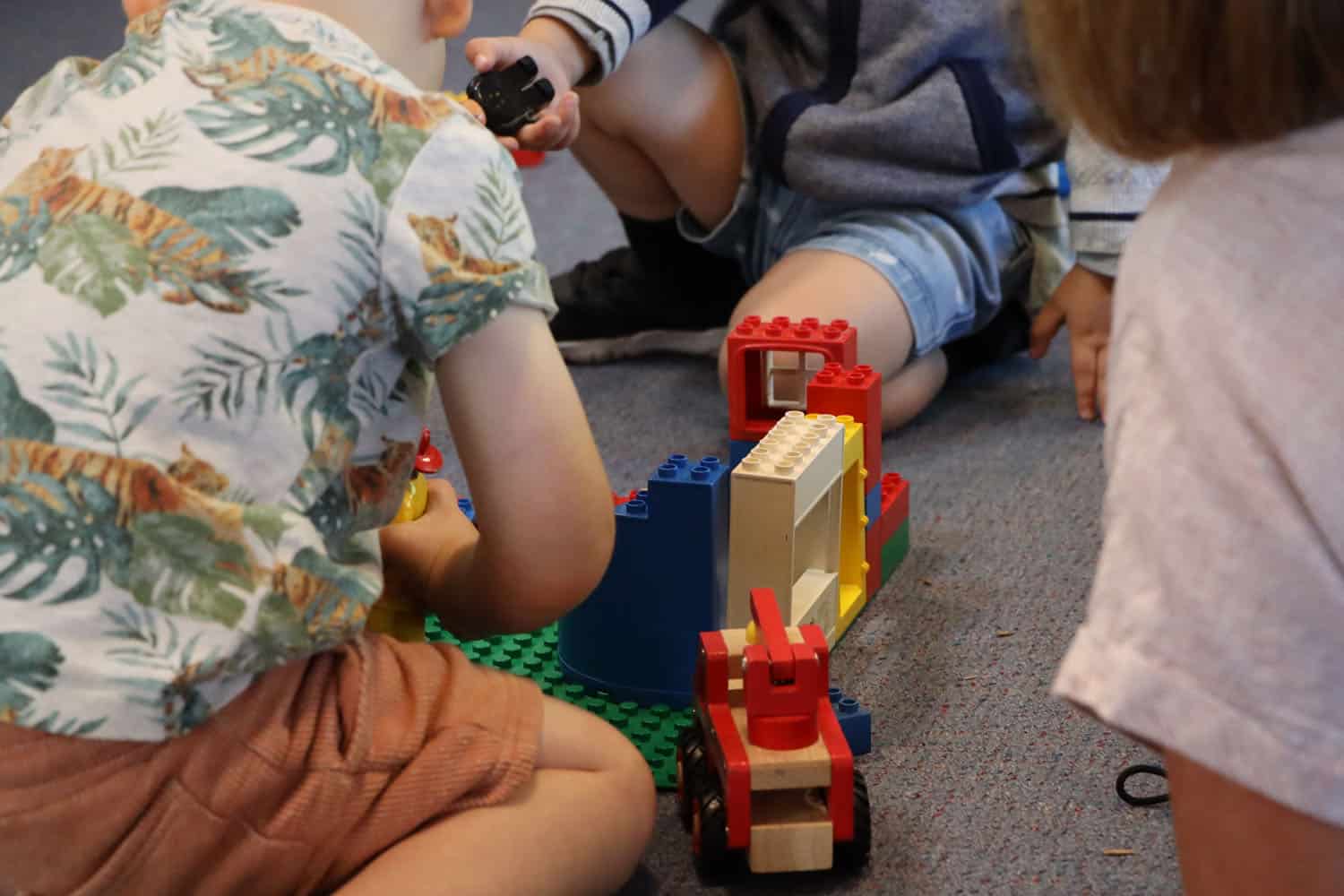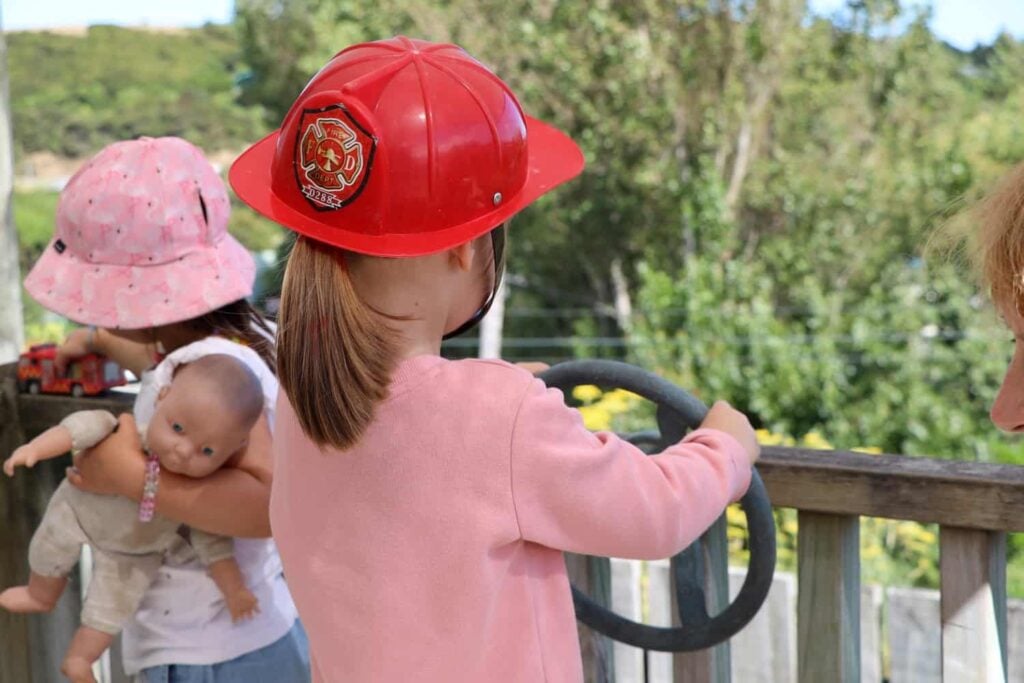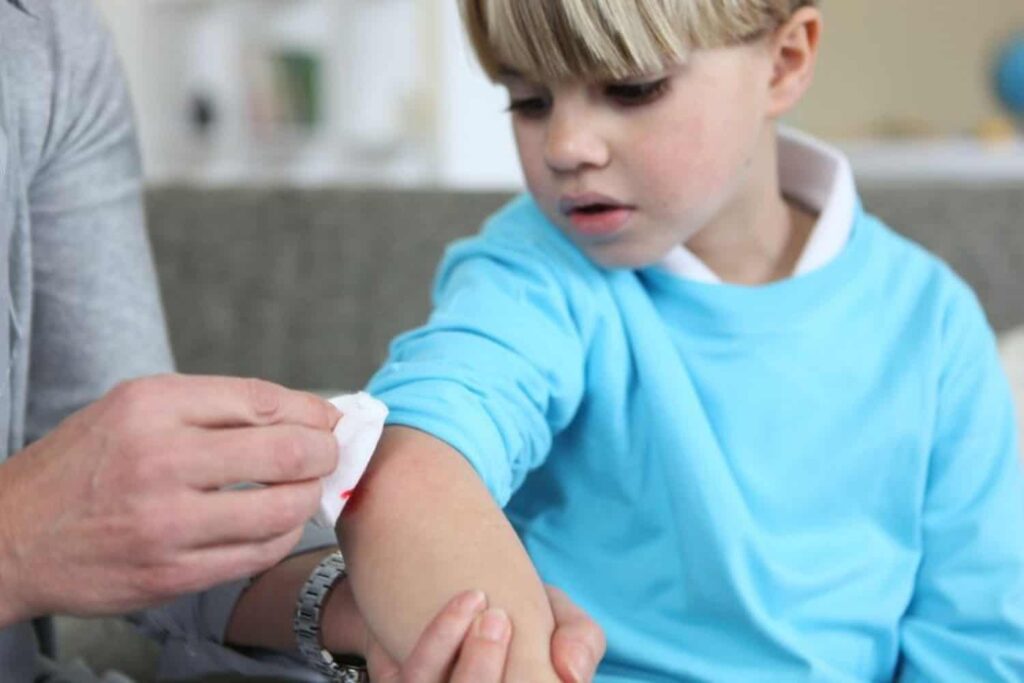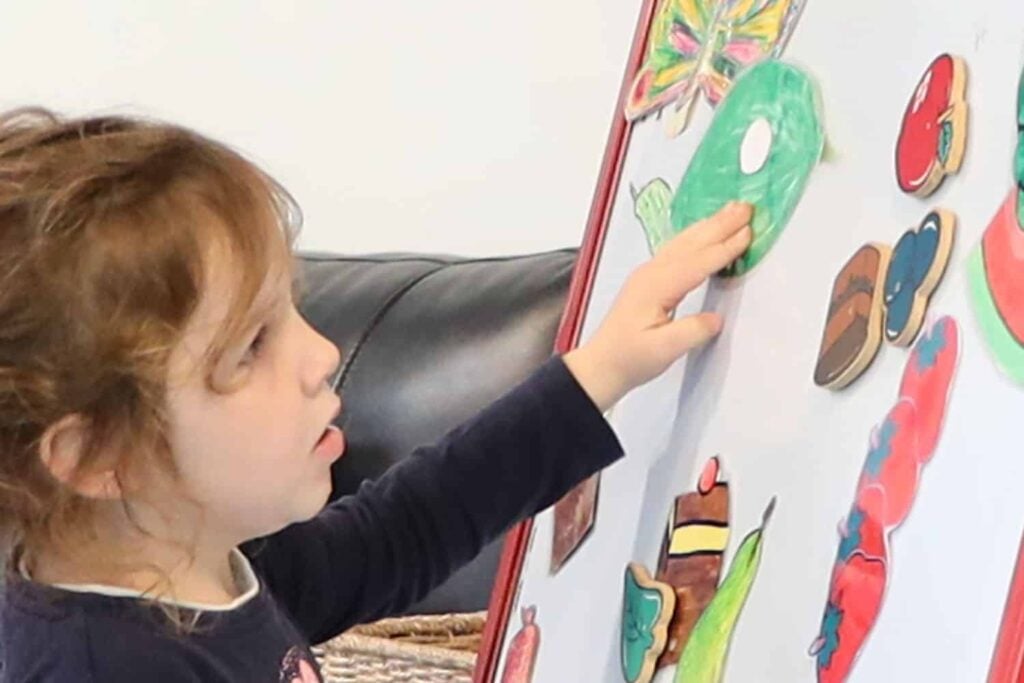Laine Barker Playcentre Campaigner.
July 10, 2012.
Laine Barker Playcentre Campaigner, is a parent who spearheaded a hugely successful campaign in Canterbury in 2011 to get the Education Minister (and Prime Minister!) to promise not to cut funding to Playcentres.
She has been the Chairperson of the Canterbury Playcentre Association and a member of the organisation since the mid 1980s.
What was your early life like?
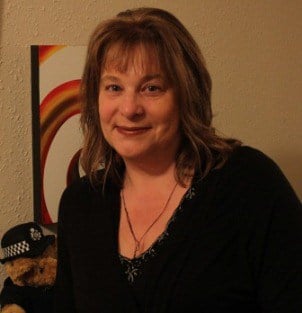
I was the oldest of three children and was brought up with a huge sense of family. Ours was a traditional upbringing with mum staying home and dad working. We went to church, attended Sunday school, belonged to the Brownies and had a very strong sense of belonging. My parents and grandparents were all from the same small rural village. We lived out of the garden and had a steady supply of homemade baking, jams and pickles. Mum knitted all of our jerseys while dad worked full-time. We moved from England to New Zealand in 1972, and my parents bought a country store to enable them to meet new people and be part of a community. We went to pony club, guides, scouts, table tennis, badminton and enjoyed a lot of freedom in our small rural village in Banks Peninsular. We fished, swam and joined the local acting troop, which I loved, and hoped to make a career out of. My parents were not rich but I know they made sacrifices to ensure that we didn’t go without. The community groups in those days cost very little if anything to belong to, so it was a bit different to how things work today. I left school with a couple of ‘school certificate’ passes and began working at a building society in town. Mum and dad said I could leave school if I got a job, so for me any job would do. I applied for a heap over a couple of weeks and this one came up first.
At 17, I found myself pregnant with my oldest son (Chris), and despite my parents being acutely embarrassed by the fact they had an unmarried daughter who was going to have an illegitimate child, they didn’t insist like so many parents of the day that I adopt him out. There was never ever any doubt in my mind that I would raise my child myself.
I was not made welcome at antenatal classes so I didn’t go to them. Chris’ dad had to make an appointment with the matron of the hospital and discuss with her his rights to be at the birth of his child and she in her wisdom granted his request. Unmarried women were put into a separate ward so as not to upset the married ones, and I was visited twice by social workers who wanted to know if I had clothes for my child and if I was being well fed by my partner. It was humiliating and belittling, but I played the game to protect my family. This was the way it was in those days. I was unmarried and the prejudices that I faced then would not be tolerated now.
The Plunket nurse visited a couple of times and was scathing of the way we were raising our child. The overwhelming thing for her was that as an unmarried young mother I could not possibly have had any idea what I was doing. Questions I had the courage to ask were met with disdain and once she even called me stupid when I asked her a question about breastfeeding. I must admit we went to radical lengths. To avoid her visits we moved house and didn’t tell her. For a few months after that I lived in fear of every knock on the door being someone coming to take my son away because he wasn’t in the Plunket system. So naïve! Happily things have changed and having a baby now is nothing like it was back in the 1970s.
Crazy though to think a small piece of metal on my finger and the exchange of a few words would have immediately accelerated my status, perceived skills in parenting and saved so much anxiety.
Married or not, no one can prepare you for the overwhelming feelings of absolute love you have for tiny babies as they arrive to consume you with their innocence, purity and total dependence. I gained a fiercely protective instinct to ensure that this child will be nurtured, protected and kept safe from all harm. I lived with his dad for a few months in town, until he decided that parenthood was not for him. From then on we lived on our own and the two of us formed a very secure and strong family unit.
Describe your career path
When my son was about a year old I met Ashley whom I married three years later. This year we celebrated our 30th wedding anniversary. We added a daughter (Katie) and another son (Luke), to the family brood. Chris had attended kindergarten and was well established at the local primary school, when we bought our first home. My daughter had not quite reached the starting age for kindergarten. We moved out of the area and when my youngest son was two years old, we discovered Playcentre through a friend. So Katie, Luke and I started Playcentre and I began the Playcentre training. From there I became a Playcentre co-ordinator with a group of parents who also were training to become co-ordinators in their own right. During that time we had two more daughters Sam and Brooke, who completed our family.
Once I finished training I worked in a Playcentre with a colleague until 1996. I also delivered education courses to parents. We moved to Hokitika in 1996 and I became a sole co-ordinator at a centre there.
When we moved back to Christchurch in 2001 I worked at Lincoln Playcentre and from there joined the Centre Support Team. The team focus was to support centres however it was needed, so the team attended ERO visits, facilitated workshops and looked at ways to improve practice. My knowledge around the requirements of running centres and the role of the Association in that grew immensely during that time. Being part of a passionate team and surrounded by giving and caring people was the icing on the cake
Playcentre is a parent co-operative. Our parents run our centres which have to meet all of the MOE regulations and requirement like every other ECE service. The Association supports the centres to ensure that every part of their practice is honed to give the best possible help to centres and ensure that our centres’ practice is of the highest quality. Support includes the CST team visits to each centre three times a term, which is a big effort considering we currently have 46 centres (50 before the earthquakes) and a current team of six.
Describe what you do
I am the Chairperson of the Canterbury Playcentre Association. In modern day terms I would be called a manager. I have a responsibility to make sure that the Association runs smoothly. I also oversee the functioning of six teams – the finance team He Waka Eke Noa, Education, Centre support, Property, Administration and Babies Can Play – that support centres. I now spend a lot of time on earthquake related issues. We are subject to more property (DEE) checks for centres, scoping and feasibility studies, employment issues, dealing with outside agencies and publicity. Centres need emotional support too. This is done sometimes with a phone call, a morning tea or just a few lines in an email. I also need to ensure the people in my office feel valued and that decisions made by the Board are made in a way that reflects our values and vision.
This can be difficult if we deal with things that don’t fit – such as employment issues. If people step outside of our values, we need to act to ensure risk management and as a Board we must also maintain confidentiality. We support each other and ensure that we are united in our decision-making.
As a licensee I am legally responsible and must ensure that centres are meeting all their licensing, health and safety requirements each session. I liaise with the Education Review Office and the Ministry of Education regularly and we have worked hard to maintain these relationships.
Who or what put you on the path to this work?
I wouldn’t say I chose this career. At the start, acting was my talent and I still would like to do something with that. The Playcentre education training really hooked me and started me on the path to lifelong learning. I love it. I went to school to eat my lunch and be the class clown but I have since completed my Playcentre training, a Dip T ECE, Mauri Ora course and B Tch Lng ECE and am currently working on a G Dip NFP.
Our education programme is relevant to what we do as parents and as centre members. Tutors take great efforts to ensure that all learning styles are catered for and that students are well supported. Learning is around the experience of being a parent and the needs of the family are also considered. If for example I had a sick child and missed a course or a discussion it is not a problem, as it can be caught up some other time. It is real and grounded, linear and not hierarchal.
I could not imagine a world without Playcentre and I wholeheartedly believe that parents are the best first educators of their children. Two of my daughters now have children who all attend the local Playcentre and I am privileged to be able to be involved with my grandchildren when I attend Playcentre with them.
What is the most interesting aspect about what you do?
I love my job. It is varied and each day I seem to find a new dimension. The people here are wonderful. We all have a shared philosophy and overall a mutual respect for each other. I really enjoy the time I spend with the team here and Playcentre is a bicultural organisation. The cultural aspects of working here are immense and so relevant. We embrace whanau and the relevance of our national heritage is not only a learning experience and a way of life, but so logical and in keeping with some of the ways by which I was raised. If I combine the cultural aspects and the maternal nurturing disposition, I can see that I am here because it is who I am and what I have always done and been a part of. I have come to the realisation that my life has made sense because of my personal experiences and intense learning journey, which, in turn, have taught me what I needed to value and how to make use of these values appropriately, and reflect on the learning that I have acquired over the years.
Are there times when it gets very stressful?
Things do get tough sometimes and I tend to go home and fix the world around 3 in the morning, which is a good time to fix stuff, but it leaves me feeling a bit washed out the next day! We have a good team here and colleagues are always good to bounce things around with. The environment for this is safe, supportive and respectful. So although we don’t always agree we respect views and know how to communicate to ensure that all voices are heard.
Lots of things can be fixed through policy, philosophy and procedure but often this is where the challenges come in too. Our values are strong but if someone doesn’t work in the same values system it can get tricky.
What would would be your biggest achievement?
Depends on the area you are talking about. Family and Playcentre and life are all intertwined for me.
I have a big family and they are very close. The girls treasure and nurture their own children and know how important it is for them to be a part of their children’s early years and their ECE. My children are independent and confident contributors to society.
My oldest son has a very successful career and when I think of the barriers and prejudices that he started his life with and combine them with his early years, with a young single mum in a state house, I am very proud of what he has become
From an academic point of view I was the first one in my generation to get any type of formal qualification and now three of my children have degrees. Playcentre gets the credit for this. If I didn’t get hooked into the training when I started I can’t imagine where we would be now.
I was very proud to lead the march through Christchurch and be the spokesperson for the Association when funding cuts to Playcentre were being threatened. We work as a team and I am proud to be part of a team that has achieved so much.
We have supported centre whanau both personally and at a centre level, and we have created and run a very successful Babies Can Play programme for new parents. This programme is especially designed for first time parents and is an education programme based on the needs of the group for the first two years of babies’ life, until they move on to Playcentre.
We have a full and successful parent training programme, we are culturally leading the way in many areas around tikanga and our centres are continuing to run under very adverse conditions here in Christchurch. Our teams are strong and all have a shared passion to be the best they can be for the centres and the whanau in them.
And what would be your biggest regret?
Life is too short for regrets. I believe in looking forward and making every experience a learning and growing experience.
For anyone considering a similar career as yours – what gems of advice might you suggest to them?
Children are our greatest gift. They deserve the very best we can give them and for me that was the gift of staying at home and learning how to be the best parent I could, even through trying times. This is the responsibility we take on when we decide to have children. Parents must value their role and society must also value parents. The trend to drop kids off for hours at a time to be cared for by strangers alarms me and I am fearful that children who grow up with a decreased sense of attachment belonging will never be able to realise their true potential.
Education is the key to everything but it must be relevant. If you don’t have the right learning environment keep going until you find it.
Would you ever consider changing your role from your current one, and if so, would pay be a consideration?
Money would not be the main consideration for me. The type of organisation we are, everyone is paid the same hourly rate and this makes us lineal. Our organisation has an unwritten understanding that we only stay in our roles for about five years. This gives us the opportunity to take on new roles within the organisation, or transfer our skills into the wider world.
I couldn’t imagine what I will do next, but I will only work in the Not for Profit sector, and I would need to feel like I was making a difference and enhancing people’s lives. I would also need to be in a place that has a culture of family first, respect, trust and caring.


